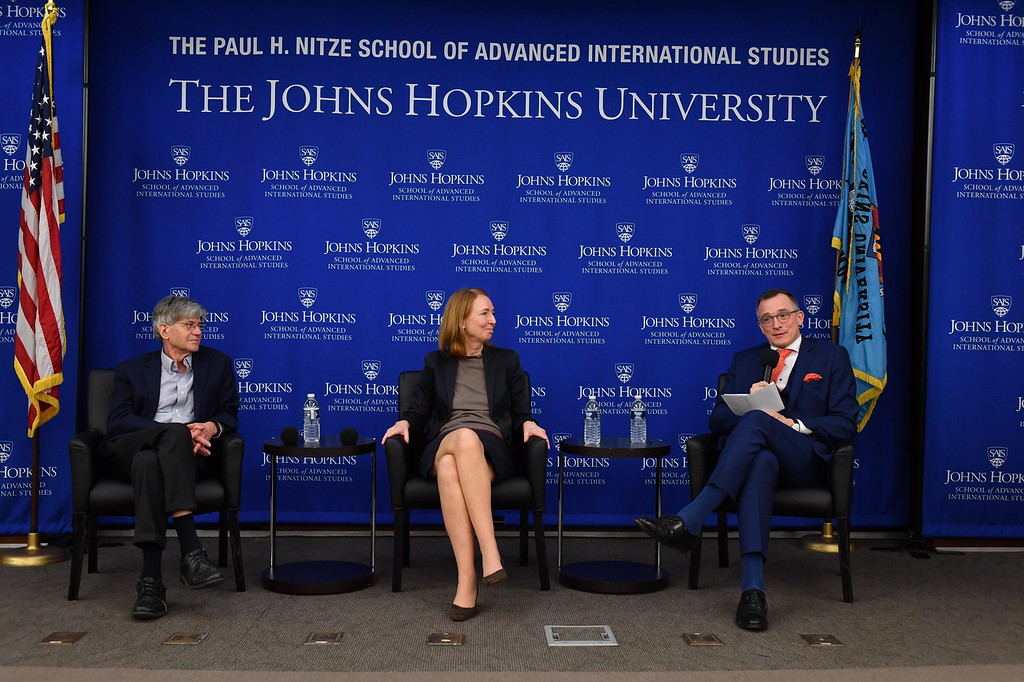Hybrid Event: Germany and the United States: What’s Next for the Transatlantic Alliance?

On Tuesday, April 5, 2022, from 9:00-10:00 AM EDT, join SAIS Dean Jim Steinberg and H.E. Emily Haber, German Ambassador to the U.S., for a conversation on the potential trajectory of the German-American alliance after the inauguration of the new German government. This event is hosted by the Henry A. Kissinger Center, featuring moderation by the Helmut Schmidt Distinguished Visiting Professor, Dr. Andreas Rödder. The event will be held in a hybrid format. If you are unable to join the event in-person, register for Zoom webinar here.
Register Now!
H.E. Haber has been German Ambassador to the United States since June 2018. Prior to her transfer to Washington, DC, she served in various leadership functions at the Foreign Office in Berlin. In 2009, she was appointed Political Director and, in 2011, State Secretary, the first woman to hold either post. Thereafter, she was deployed to the Federal Ministry of the Interior, serving as State Secretary in charge of homeland security and migration policy from 2014 until 2018. H.E. Haber has many years of experience with Russia and the former Soviet Union. She held various posts at the German Embassy in Moscow, including Head of the Political Department. At the Foreign Office in Berlin, she served as Head of the OSCE Division and as Deputy Director-General for the Western Balkans, among other positions.
The Helmut Schdmit Distinguished Visiting Professor Dr. Andreas Rödder holds the chair for Modern and Contemporary History at the Johannes Gutenberg University Mainz and is the Helmut Schmidt Distinguished Visiting Professor at Johns Hopkins SAIS, a visiting professorship supported by the DAAD and the German Federal Foreign Office. His main fields of interests cover the history of Victorian England, German history and international politics in the 20th century, in particular the history of 1989/90 and contemporary history after 1990. His current research project investigates the history of Europe’s global impact since the 19th century in order to provide a fresh answer to the difficult question what Europe has given to the world and what has it taken from it. Andreas Rödder has written six major books, including Stresemann’s Legacy. Julius Curtius and German Foreign Policy 1929-1931 (“Stresemanns Erbe. Julius Curtius und die deutsche Außenpolitik 1929-31”, 1996), The Political Culture of the English Conservatives between Rural Tradition and Modern Industrial Age 1846-1868 (“Die radikale Herausforderung. Die englischen Konservativen zwischen ländlicher Tradition und industrieller Moderne“, 2002), a history of the Federal Republic of Germany, 1969-1990 (Die Bundesrepublik Deutschland 1969-1990, 2004), and a history of German Reunification (Deutschland einig Vaterland. Die Geschichte der Wiedervereinigung, 2009). 21.0. A short history of our time (“21.0 Eine kurze Geschichte der Gegenwart”) was published in 2015 and lauded as “mastering the apparently impossible”. His most recent scholarly book, “Who’s afraid of Germany? History of a European Problem” (Wer hat Angst vor Deutschland? Geschichte eines europäischen Problems, 2018) combines the history of German power in Europe with an analysis of the discrepancy between German self-concepts and European perceptions of Germany since the 19th century: what Germans regarded as their undeniable rights, others considered as German ambition for hegemony.
In addition to his academic work, Andreas Rödder is highly experienced in policy counseling and political commentation. He has been a member of the board of the Konrad-Adenauer-Foundation since 2006, participated in the Chatham House Commission on Democracy and Technology (2019/20), has been appointed to the Commission on Integration established by the German Federal Government in 2019, and is regularly invited to high-level off-the record conversation circles. In 2011 and 2016 he ran as shadow minister for education in the electoral campaign in the state of Rheinland-Pfalz, and in 2019, he published his manifesto of a contemporary Conservatism („Konservativ 21.0. Eine Agenda für Deutschland“).
Date and time
9:00 AM – 10:00 AM EDT
Location
1740 Massachusetts Avenue, NW
Washington, DC 20036
View Map
Reasonable accommodations can be provided at the request of guests and visitors with disabilities. Arrangements should be made in advance of the date of the event. A minimum of 10 business days’ notice is required for any accommodation. To request accommodations, please contact [email protected] or 202-999-3332.